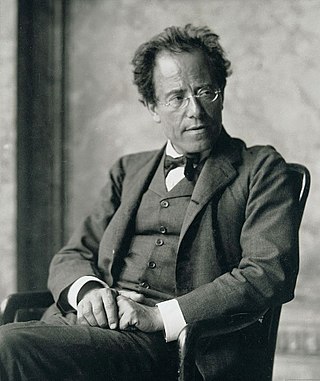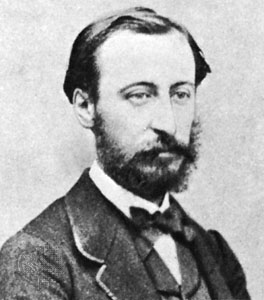Related Research Articles
Robert Wilfred Levick Simpson was an English composer, as well as a long-serving BBC producer and broadcaster.

The Symphony No. 7 by Gustav Mahler was written in 1904–05, with repeated revisions to the scoring. It is sometimes referred to by the title Song of the Night, which Mahler never knew. Although the symphony is often described as being in the key of E minor, its tonal scheme is more complicated. The symphony's first movement moves from B minor (introduction) to E minor, and the work ends with a rondo finale in C major. Thus, as Dika Newlin has pointed out, "in this symphony Mahler returns to the ideal of 'progressive tonality' which he had abandoned in the Sixth". The complexity of the work's tonal scheme was analysed in terms of "interlocking structures" by Graham George.

The Symphony No. 6 in A minor by Gustav Mahler is a symphony in four movements, composed in 1903 and 1904, with revisions from 1906. It is sometimes nicknamed the Tragic ("Tragische"), though the origin of the name is unclear.

The Symphony No. 9 by Gustav Mahler was written between 1908 and 1909, and was the last symphony that he completed. A typical performance takes about 75 to 90 minutes. A survey of conductors voted Mahler's Symphony No. 9 the fourth greatest symphony of all time in a ballot conducted by BBC Music Magazine in 2016. As in the case of his earlier Das Lied von der Erde, Mahler did not live to see his Symphony No. 9 performed.
Jascha Horenstein was an American conductor.
The Cello Concerto No. 1 in E-flat major, Op. 107, was composed in 1959 by Dmitri Shostakovich. Shostakovich wrote the work for his friend Mstislav Rostropovich, who committed it to memory in four days. He premiered it on October 4, 1959, at the Large Hall of the Leningrad Conservatory with the Leningrad Philharmonic Orchestra conducted by Yevgeny Mravinsky. The first recording was made in two days following the premiere by Rostropovich and the Moscow Philharmonic Orchestra conducted by Aleksandr Gauk.

The Piano Concerto No. 2 in G minor, Op. 22 by Camille Saint-Saëns was composed in 1868 and is probably Saint-Saëns' most popular piano concerto. It was dedicated to Madame A. de Villers. At the première on 13 May the composer was the soloist and Anton Rubinstein conducted the orchestra. Saint-Saëns wrote the concerto in three weeks and had very little time to prepare for the première; consequently, the piece was not initially successful. The capricious changes in style provoked Zygmunt Stojowski to quip that it "begins with Bach and ends with Offenbach."

Sir Edward Elgar's Symphony No. 1 in A♭ major, Op. 55 is one of his two completed symphonies. The first performance was given by the Hallé Orchestra conducted by Hans Richter in Manchester, England, on 3 December 1908. It was widely known that Elgar had been planning a symphony for more than ten years, and the announcement that he had finally completed it aroused enormous interest. The critical reception was enthusiastic, and the public response unprecedented. The symphony achieved what The Musical Times described as "immediate and phenomenal success", with a hundred performances in Britain, continental Europe and America within just over a year of its première.

Anton Bruckner's Symphony No. 8 in C minor, WAB 108, is the last symphony the composer completed. It exists in two major versions of 1887 and 1890. It was premiered under conductor Hans Richter in 1892 at the Musikverein, Vienna. It is dedicated to the Emperor Franz Joseph I of Austria.
Symphony No. 4, Op. 29, FS 76, also known as "The Inextinguishable", was completed by Danish composer Carl Nielsen in 1916. Composed against the backdrop of the First World War, this symphony is among the most dramatic that Nielsen wrote, featuring a "battle" between two sets of timpani.

Unicorn-Kanchana is a British independent record label founded by John Goldsmith, a former London police officer. Originally known as Unicorn Records, the name Kanchana was added later. In Hindu and Buddhist mythology, the female name Kanchana means an Apsara, a spirit of the clouds and waters.
The Piano Concerto No. 2 in G major, Sz. 95, BB 101 of Béla Bartók is a musical composition for piano and orchestra. The work, which was composed between 1930 and 1931, is notorious for being one of the most difficult pieces in the repertoire.
The Symphony No. 1 by Robert Simpson was completed in 1951 and submitted as his doctorate thesis for the University of Durham. Simpson was only 30 years old at the time of submission.
The Symphony No. 2 by Robert Simpson was completed in 1956 and dedicated to Anthony Bernard, conductor of the London Chamber Orchestra, though the first performance was in fact given by the Hallé Orchestra conducted by Sir John Barbirolli on 16 July 1957 at the Cheltenham Festival.
The Symphony No. 5 by Robert Simpson was written in 1972 and "dedicated in admiration" to the London Symphony Orchestra, who gave the premiere on May 3, 1973, conducted by Andrew Davis. The second performance in England didn't take place until 1984.
Robert Simpson composed his Symphony No. 10 in 1988 and dedicated it to the conductor Vernon Handley who gave the premiere of the work in the Philharmonic Hall, Liverpool, on 16 January 1991 with the Royal Liverpool Philharmonic Orchestra. This is Simpson's largest and longest symphony, being one of his most contrapuntal works and in four substantial movements.
Robert Simpson composed his Symphony No. 11 in 1990, dedicating the work to the conductor and composer Matthew Taylor, who was scheduled to give the premiere at Cheltenham Town Hall with the City of London Sinfonia on 15 July 1991. However, this event never took place, and the actual premiere was given at the Malvern Festival in 1992, by the same performers.
The Austrian composer Anton Bruckner composed eleven symphonies, the first, the Symphony in F minor in 1863, the last, the unfinished Ninth symphony from 1893 to 1896.
Symphony No. 4 in E-flat major is an orchestral work by Swedish composer Franz Berwald written in 1845. Berwald considered naming the symphony "Sinfonie naïve" but the autograph score is simply inscribed "No. 4 in E flat". Berwald attempted to interest French composer/conductor Daniel Auber in premiering the symphony but it had to wait until April 9, 1878 when it was finally given a first performance under Berwald champion Ludvig Norman.

The Symphony No. 1 in G minor by Russian composer Vasily Kalinnikov was written from 1894 to 1895 and first published in 1900. The symphony is dedicated to Russian music critic and teacher Semyon Kruglikov.
References
- ↑ Andrew Jacksons, "Recordings and Reviews of Simpson's Works Archived 2008-10-11 at the Wayback Machine . Accessed 4 March 2008